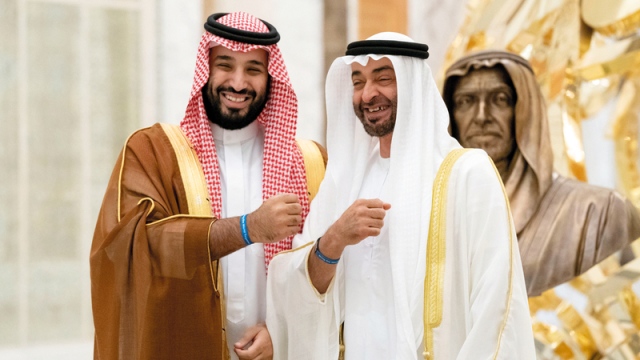The Arab world after a long time is watching the rise of two leaders who are driven to transform their countries as well as the region at large. Domestic political changes have propelled UAE Crown Prince Mohammed bin Zayed al Nahyan to unparalleled leadership of the seven-emirate state. From Libya to the Horn of Africa, Sudan to the Gulf, his vision of the UAE as a more engaged regional and international power now informs the Emirati approach. On the other hand, the Saudi Arabians for a very long time were only known for two things- Wahabi Islam and Oil money. However, since the coming of crown prince Mohammed bin Salman, the tides are starting to change, and Saudi Arabia is becoming more and more proactive as well as collaborative with the larger US allies. This has, in turn, led to the implementation of decisions that show inculcation of astute diplomatic skills
Mohammed bin Zayed al Nahyan or “MBZ” – as he is widely known – has, indeed, led a regional campaign to prop up the Arab world’s status quo. “He’s pursued an almost ‘zero tolerance’ approach,” Kristian Coates Ulrichsen, Gulf expert and fellow for the Middle East at Rice University’s Baker Institute, told Asia Times. “He wants to eliminate threats before they even begin to have an impact.” Those threats include both radical Islamists and secular democrats, at home and abroad.
This new label The UAE is eager to show that it can be a trustworthy partner for the US focused on human rights, the ongoing Yemen conflict, and getting back to the negotiating table with Iran. Despite these developments, Thomas Juneau, a Middle East expert at the University of Ottawa, told Asia Times, “I fully expect the Emiratis to stay quite involved regionally.” “The UAE’s wealth, military might, and interventions are all here to stay.”
Arab countries, especially Saudi Arabia, have had the greatest influence in the Islamic world for a very long time. With the establishment of OPEC in the year 1960, Saudi Arabia’s GDP started growing at a fast pace due to the increasing demand for oil and the systematisation of the dispensation of crude oil. In 1973, where the GDP of this country was just $15 billion, by the year 1980 it had increased to $184 billion.
In the meantime, Riyadh has vigorously raised many global issues affecting the Islamic world, of which Palestine and Kashmir were the most important. On the back of its oil reserves, Saudi Arabia started dominating global politics. The biggest example of this is the “oil embargo” imposed on the US in 1973 by OPEC. In 1973, when there was a war between the Arab countries and Israel, the US assisted Israel, because of this, OPEC refused to give oil to the US, under the leadership of Saudi Arabia.
Mohammed bin Salman is today considered the de-facto ruler of Saudi Arabia and who is advancing the clear and effective diplomacy of his country without centring it on “oil”. Today, Saudi Arabia is creating a geo-political and economic transition whereby, even if there is a huge drop in the oil demand, Saudi Arabia will continue to maintain the same position in the Middle East as it will be one of the countries that transitioned early away from dependence on Crude Oil.
The UAE has shown its capacity to pivot quickly on the international scene, recovering quickly from setbacks while remaining committed to its larger strategy of restraining Islamic parties and their Turkish and Qatari allies. “He’s already 60 years old and will likely be in situ for another 20 to 25 years,” Ulrichsen adds of MBZ. The crown prince and future emir of the United Arab Emirates has a lot more to offer.
On the other hand, Saudi Arabia has now become a champion of diplomacy under the leadership of MBS, through which it is now improving its relationship globally. The country is no longer simply a merchant of oil but is becoming successful in its efforts to establish itself as a major trading centre in the coming decades and a geopolitical juggernaut.
By putting all these facts together, we can say that MBS and MBZ are the two leaders who are changing the Arab world forever.








